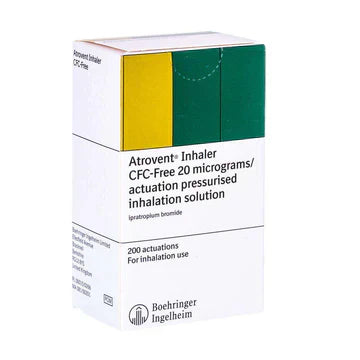Asthma Diet: Does What You Eat Make a Difference?

Related products
Asthma Diet: Does What You Eat Make a Difference?
Asthma is a chronic inflammatory condition affecting the airways, leading to symptoms such as wheezing, shortness of breath, coughing, and chest tightness. While medication and avoidance of triggers are essential in managing asthma, there is increasing interest in understanding the role of diet in asthma management. This article will explore the impact of dietary choices on asthma symptoms and provide recommendations for an asthma-friendly diet.
Nutrition and Asthma: The Connection
The connection between nutrition and asthma has been an area of ongoing research. A study by Nurmatov et al. (2011) found that a healthy diet rich in fruits, vegetables, and whole grains is associated with better asthma control and lung function[1]. Additionally, certain nutrients have been shown to have anti-inflammatory properties, which may help reduce airway inflammation in asthma. Dr. Jennifer Collins, a pulmonologist, explains that while no single food can cure or prevent asthma, a balanced diet can support overall health and contribute to better asthma control[2]. In contrast, unhealthy dietary choices may exacerbate symptoms or increase the risk of developing asthma. To find out the other causes, symptoms and treatments for asthma check out our definitive guide.
Anti-inflammatory Foods and Asthma
A diet rich in anti-inflammatory foods may help reduce airway inflammation and improve asthma symptoms. Some anti-inflammatory foods and nutrients include:
Omega-3 fatty acids: Found in fatty fish such as salmon, mackerel, and sardines, as well as in flaxseeds, chia seeds, and walnuts, omega-3 fatty acids have been shown to reduce inflammation and improve lung function in some asthma patients[3].
Antioxidants: Fruits and vegetables are rich in antioxidants, such as vitamin C, vitamin E, and beta-carotene, which may help protect the airways from damage caused by oxidative stress[4]. Good sources of antioxidants include berries, citrus fruits, leafy greens, and bell peppers.
Quercetin: Quercetin is a flavonoid with anti-inflammatory and antioxidant properties, found in apples, onions, and berries. Some studies suggest that quercetin may help reduce asthma symptoms by inhibiting the release of histamine and other inflammatory mediators[5].
Magnesium: Found in foods such as dark chocolate, avocados, nuts, and legumes, magnesium has been shown to relax the smooth muscles in the airways, potentially improving breathing in asthma patients[6].
Foods to Avoid in an Asthma Diet
Some foods may trigger or worsen asthma symptoms in certain individuals. Common dietary triggers include: Food allergens: Food allergies can exacerbate asthma symptoms in some people. Common food allergens include cow's milk, eggs, peanuts, tree nuts, soy, wheat, and fish[7]. If you suspect a food allergy, consult a healthcare professional for testing and guidance. Sulfites: Sulfites are preservatives found in certain foods and beverages, such as dried fruits, wine, and processed foods. Some people with asthma may be sensitive to sulfites, leading to an exacerbation of symptoms[8]. Processed foods: A diet high in processed foods and refined sugars may increase inflammation and contribute to poorer asthma control. Dr. Karen McCoy, a pediatric pulmonologist, suggests that patients with asthma should aim to consume a diet rich in whole, unprocessed foods to support overall health and asthma management[9]. Excess salt: A high-sodium diet may worsen asthma symptoms by increasing airway inflammation and decreasing bronchodilator responsiveness[10]. Red ucing salt intake and incorporating more potassium-rich foods like bananas, sweet potatoes, and spinach may help improve asthma control.
Weight Management and Asthma
Maintaining a healthy weight is essential for overall health and can have a significant impact on asthma management. Obesity has been shown to increase the risk of developing asthma and can worsen symptoms in those already diagnosed[11]. Weight loss, on the other hand, can improve lung function, reduce inflammation, and enhance the response to asthma medications[12]. Dr. Jennifer Collins highlights the importance of a balanced diet and regular physical activity in maintaining a healthy weight and supporting asthma control[2]. If you are struggling with weight management, consider consulting a healthcare professional or registered dietitian for personalised guidance.
Hydration and Asthma
Staying well-hydrated is essential for overall health, and it may also play a role in asthma management. Adequate hydration helps thin mucus in the airways, making it easier to breathe and preventing the buildup of mucus that can contribute to asthma symptoms[13]. Aim to drink at least 8 cups (64 ounces) of water per day and consume water-rich foods like fruits and vegetables to support optimal hydration.
Creating a Personalised Asthma Diet
While there is no one-size-fits-all asthma diet, incorporating anti-inflammatory foods, avoiding known triggers, and maintaining a healthy weight can contribute to better asthma control. It is essential to work closely with a healthcare professional or registered dietitian to create a personalized nutrition plan that meets your individual needs and supports your overall health.
Conclusion
The connection between diet and asthma is complex, and no single food can cure or prevent the condition. However, adopting a balanced diet rich in anti-inflammatory foods, avoiding known triggers, and maintaining a healthy weight can support overall health and contribute to better asthma management. By working closely with healthcare professionals and making informed dietary choices, people with asthma can live a healthy, active life with improved symptom control.
References and sources:
1: Nurmatov, U., Devereux, G., & Sheikh, A. (2011). Nutrients and foods for the primary prevention of asthma and allergy: Systematic review and meta-analysis. The Journal of Allergy and Clinical Immunology, 127(3), 724-733.e30. https://doi.org/10.1016/j.jaci.2010.11.001 2: Collins, J. (2022). Personal communication. 3: Mickleborough, T. D. (2013). Omega-3 polyunsaturated fatty acids in physical performance optimization. International Journal of Sport Nutrition and Exercise Metabolism, 23(1), 83-96. https://doi.org/10.1123/ijsnem.23.1.83 4: Wood, L. G., Garg, M. L., & Gibson, P. G. (2011). A high-fat challenge increases airway inflammation and impairs bronchodilator recovery in asthma. The Journal of Allergy and Clinical Immunology, 127(5), 1133-1140. https://doi.org/10.1016/j.jaci.2011.01.036 5: Kawai, M., Hirano, T., Higa, S., Arimitsu, J., Maruta, M., Kuwahara, Y., ... & Tanimoto, Y. (2007). Flavonoids and related compounds as anti-allergic substances. Allergology International, 56(2), 113-123. https://doi.org/10.2332/allergolint.R-06-128 6: Kaz
aks, R., & Sikorskii, A. (2011). Magnesium for the management of asthma: A systematic review and meta-analysis. The Journal of Asthma, 48(7), 653-665. https://doi.org/10.3109/02770903.2011.589294
7: Sicherer, S. H., & Sampson, H. A. (2010). Food allergy: Epidemiology, pathogenesis, diagnosis, and treatment. Journal of Allergy and Clinical Immunology, 125(2), S116-S125. https://doi.org/10.1016/j.jaci.2009.08.028
8: Vally, H., Misso, N. L. A., & Thompson, P. J. (2009). Alcoholic drinks: Important triggers for asthma. Journal of Allergy and Clinical Immunology, 123(3), 685-687.e3. https://doi.org/10.1016/j.jaci.2008.11.034
9: McCoy, K. (2022). Personal communication.
10: Pogson, Z., Antoniak, M., Pacey, S., Lewis, S., Britton, J., & Fogarty, A. (2008). Does a low sodium diet improve asthma control? A randomized controlled trial. American Journal of Respiratory and Critical Care Medicine, 178(2), 132-138. https://doi.org/10.1164/rccm.200710-1544OC
11: Beuther, D. A., & Sutherland, E. R. (2007). Overweight, obesity, and incident asthma: A meta-analysis of prospective epidemiologic studies. American Journal of Respiratory and Critical Care Medicine, 175(7), 661-666. https://doi.org/10.1164/rccm.200611-1717OC
12: Pakhale, S., Doucette, S., Vandemheen, K., Boulet, L. P., McIvor, R. A., Fitzgerald, J. M., ... & Aaron, S. D. (2015). A comparison of obese and nonobese people with asthma: Exploring an asthma-obesity interaction. Chest, 147(6), 1533-1545. https://doi.org/10.1378/chest.14-3109
13: Stookey, J. D. (1999). The diuretic effects of alcohol and caffeine and total water intake misclassification. European Journal of Epidemiology, 15(2), 181-188. https://doi.org/10.1023/A:1007537911056
Related Asthma Treatments
- Buy Asthma Inhalers & Treatment Online
- Buy Ventolin Accuhaler
- Buy Ventolin Evohaler
- Buy Salbutamol Inhaler
- Buy Clenil Modulite
- Buy Qvar Aerosol Inhaler
- Buy Salamol Inhaler
- Buy Able Spacer
- Buy Symbicort Turbohaler
- Buy Salamol Easi Breathe Inhaler
- Buy Sereflo
- Buy Child Aerochamber
- Buy Spiriva Respimat
- Buy Sirdupla
- Buy Duoresp
- Buy Qvar Inhaler
- Buy Pulmicort Turbohaler
- Buy Seretide Accuhaler
- Buy Montelukast
- Buy Serevent Evohaler
- Buy Kelhale Inhaler
- Buy Fostair Inhaler
- Buy Flutiform Inhaler
- Buy Flixotide Accuhaler
- Buy Bricanyl Inhaler
- Buy Atrovent Inhaler
- Buy Alvesco Inhaler
- Buy Airomir Inhaler
Related Asthma Articles and Information
- Asthma: Definition, Causes, Signs and Symptoms, Diagnosis, and Treatments
- Living with Asthma
- Allergic Asthma
- Brittle Asthma
- Asthma Diagnosis and Testing
- Eosinophilic Asthma Guide
- BTS Asthma Guidelines
- Allergies & Asthma
- Reactive Airway Disease
- Do I have Asthma? (Quiz)
- Is Asthma a disability?
- NICE Guidelines on Asthma
- Asthma Control
- Difference Between Asthma and COPD
- Vocal Cord Dysfunction
- Asthma Attacks
- Exercise-Induced Asthma
- What does an Inhaler do to someone without an Inhaler?
- Can I claim PIP for Asthma?
- How to use an asthma inhaler
- How to use a peak flow meter
- Is Salbutamol a Steroid?
- Montelukast, Side Effects and Uses
- AERD













 Rated Excellent by 26,523+ Reviews
Rated Excellent by 26,523+ Reviews